In the previous post(1), I shared four steps based on REBT(2), to quickly help lower your distress or frustration about something. Here is a slightly improved version of the steps:
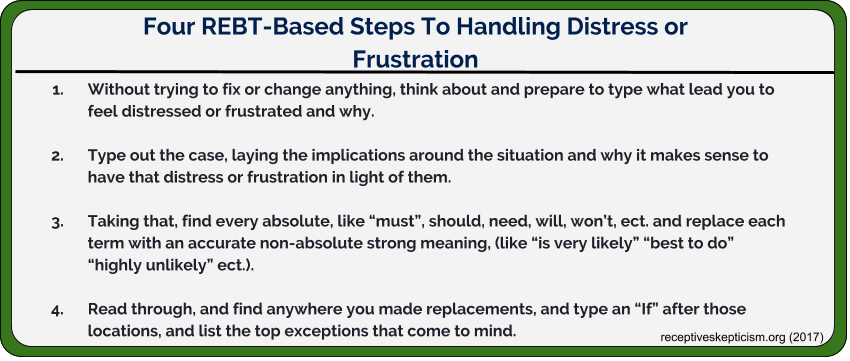 Why replace the absolutes and add potentials(3) through adding “if”? We do it because we get rid of too many potentials if we aren’t careful. This happens because we think by narrowing down potentials. Look at how we do it with stuff, (in this case, a small spoon):
Why replace the absolutes and add potentials(3) through adding “if”? We do it because we get rid of too many potentials if we aren’t careful. This happens because we think by narrowing down potentials. Look at how we do it with stuff, (in this case, a small spoon):
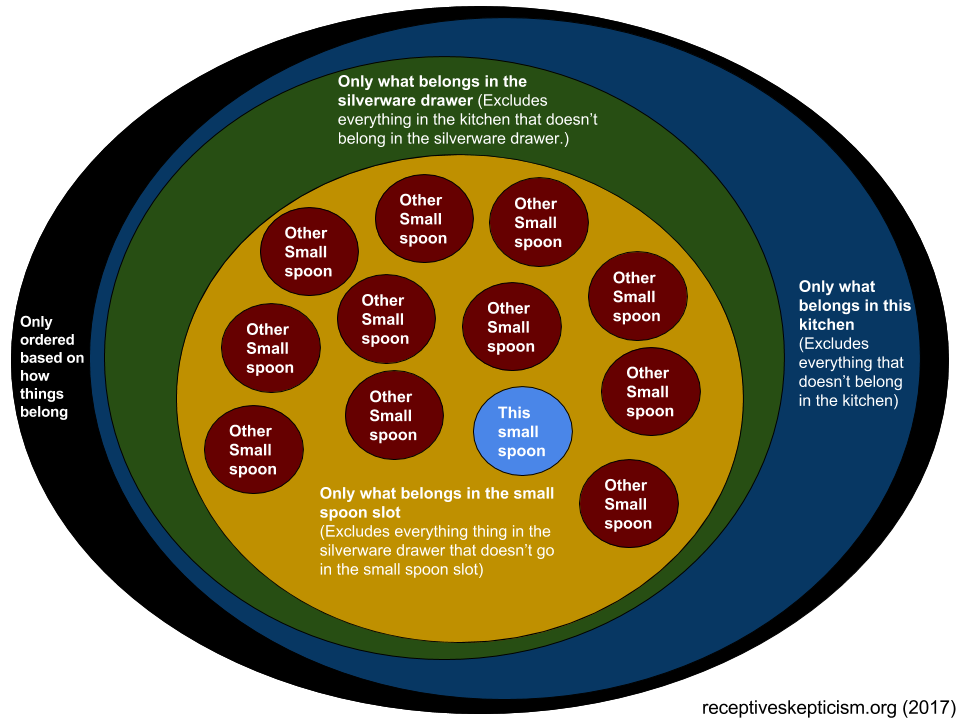 The problem comes if we assume that because the spoon belongs there, that it has to be there:
The problem comes if we assume that because the spoon belongs there, that it has to be there:
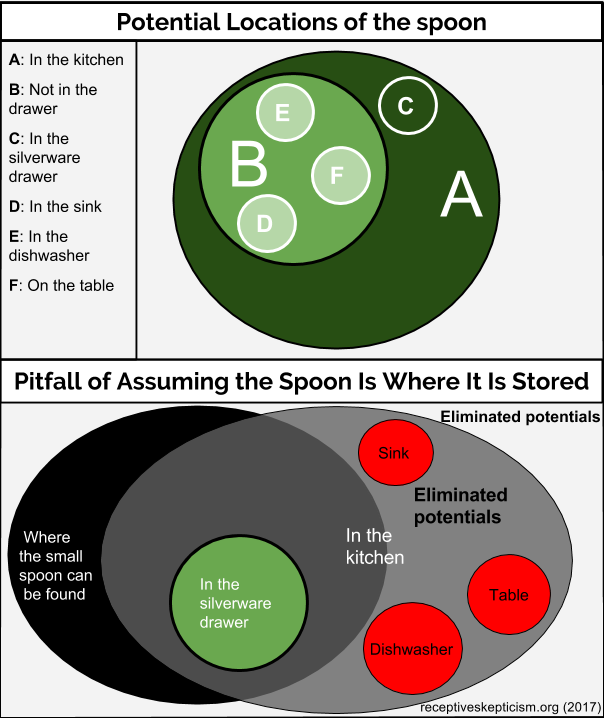 We need to be careful when we narrow down possibilities. When we narrow possibilities, like the above, we do it by excluding them and shifting our focus to what’s possible within the exclusion criteria:
We need to be careful when we narrow down possibilities. When we narrow possibilities, like the above, we do it by excluding them and shifting our focus to what’s possible within the exclusion criteria:
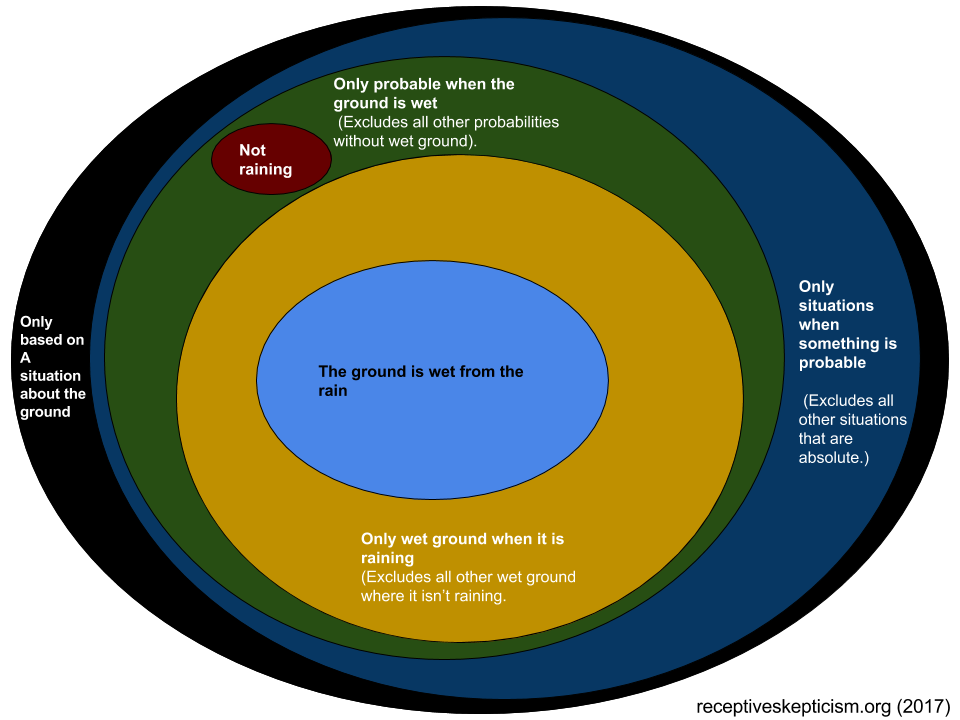
But we can get more precise than this. Look at the difference when we take the above conditions and add “If” to “Only wet ground when it is raining” where there appears to be one probable outcome. Every new condition we add now, exposes unrealized potentials, and makes what’s probable look a lot different:
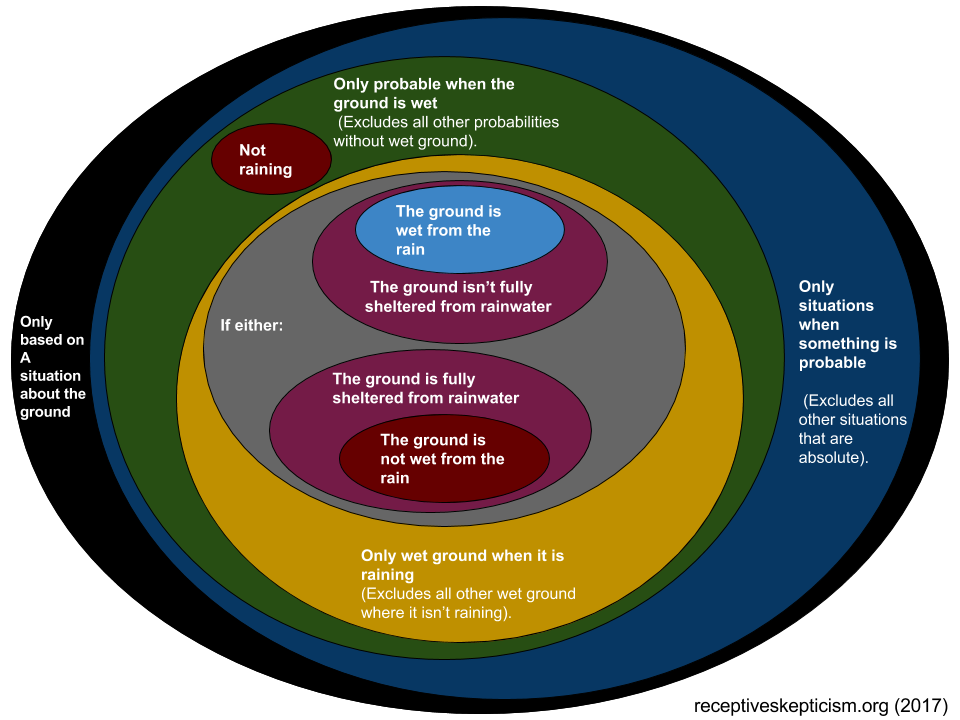 Life is complicated, and possibilities are hard to see. The above shows that when we oversimplify our situations with absolutes, we easily lose sight of what’s possible or likely. When we do that, the outcome can be pretty bleak:
Life is complicated, and possibilities are hard to see. The above shows that when we oversimplify our situations with absolutes, we easily lose sight of what’s possible or likely. When we do that, the outcome can be pretty bleak:
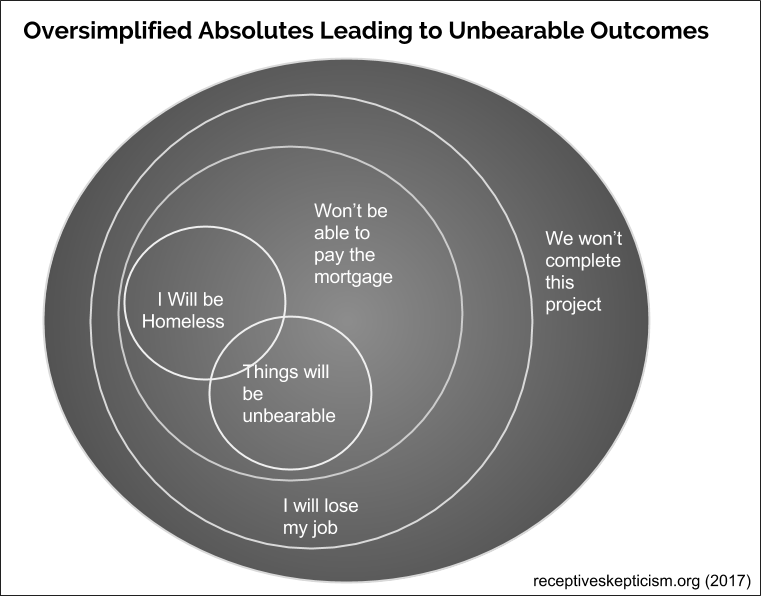 Recovering those unseen possibilities helps us both better handle our situation, and points us in the direction of improving the situation:
Recovering those unseen possibilities helps us both better handle our situation, and points us in the direction of improving the situation:
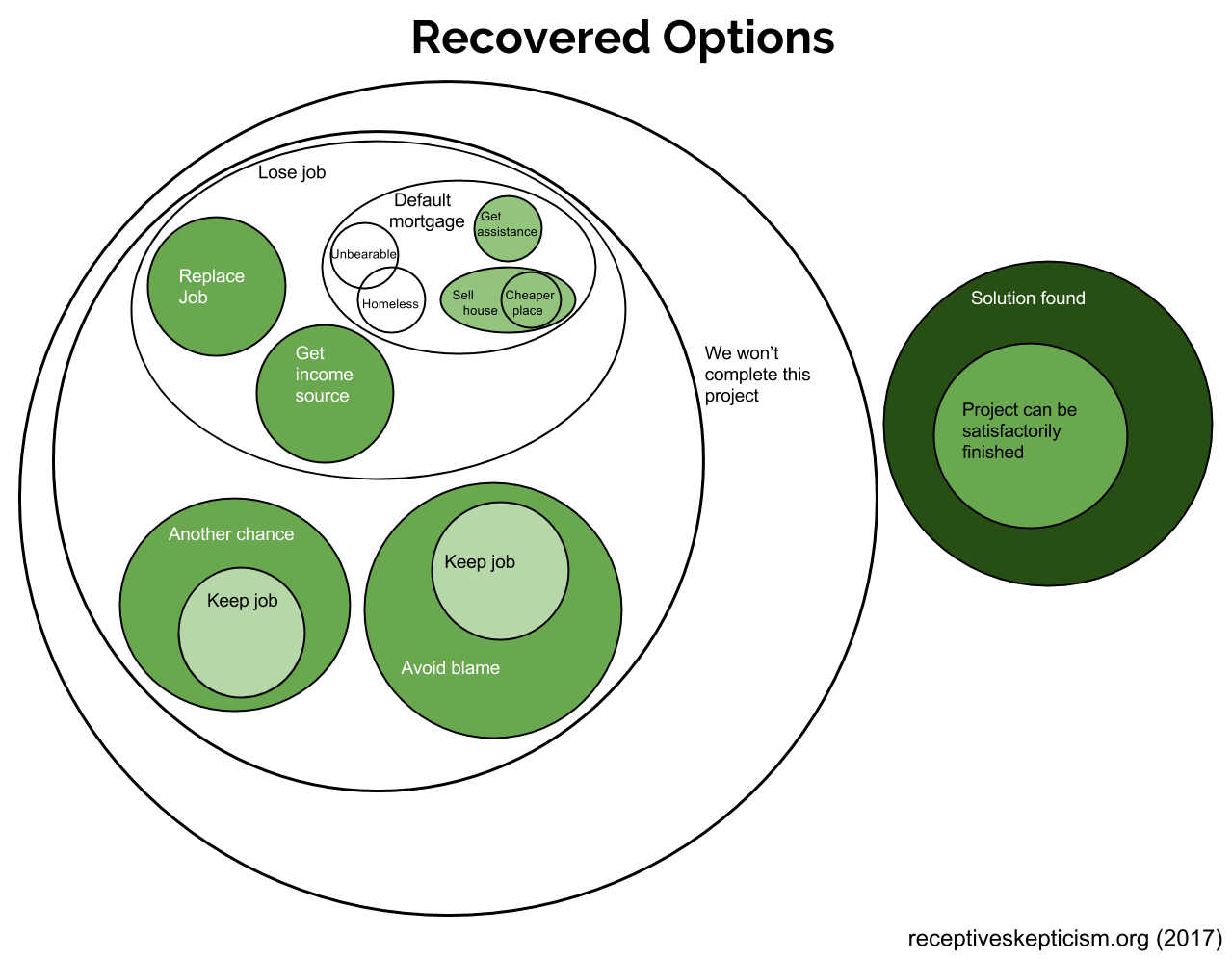 So once more, here are the four steps you can use to help better manage your feelings:
So once more, here are the four steps you can use to help better manage your feelings:
 Once you get used to the steps, make sure to look into the other factors that REBT involves. The REBT Network(4) is a great resource for further reading. Our feelings come from what we believe to be true about our circumstances. If we correct our misunderstandings about our circumstances, our feelings will change.
Once you get used to the steps, make sure to look into the other factors that REBT involves. The REBT Network(4) is a great resource for further reading. Our feelings come from what we believe to be true about our circumstances. If we correct our misunderstandings about our circumstances, our feelings will change.
Links and Sources:
- Four Steps to Handle Your Feelings When It Seems Like You Can’t
- The Albert Ellis Institue
- Ellis, A., Dryden, W., & DiGiuseppe, R. (2007). The practice of rational emotive behavior therapy (2nd ed.). New York: Springer Publishing Company.
- What is REBT?

Hi John,
I like this very much, and appreciate its very specific practical emphasis, though I think the diagrams need to be discussed and opened up for the reader rather more. I have done a fair amount of similar work myself on the negative effects of absolutisation and the importance of provisionality as an alternative. Being able to imagine alternatives is crucial to the practice of provisionality, but I think there are a number of other conditions involved that can encourage that awareness of possible alternatives – these are not just about processes of reasoning, but can also involve, for example, mindfulness and the arts. You can find a developed account of provisionality along with related principles such as scepticism, agnosticism, incrementality and integration in my videos and books on Middle Way Philosophy, e.g. starting here: http://www.middlewaysociety.org/audio/middle-way-philosophy-introductory-videos/middle-way-philosophy-1-introductory-video/
Hi Robert, thanks for visiting and sharing the link from your FB page, and for your appreciation for the post. My hope most of all, is that people will have this as a resource to make things just a bit easier for them. Are you familiar with REBT too?
I think we are somewhat on the same page as far as well-roundedness goes. This post is meant to just be introductory, and more is definitely needed. I may add more resources, but for now I tend to direct people to the Kahn Academy link for Wireless Philosophy’s Introduction to Critical thinking ( https://www.khanacademy.org/partner-content/wi-phi/wiphi-critical-thinking#wiphi-fundamentals ) I agree about using other methods to become aware of possibilities. I also think a great combination is the mindfulness practices of Gestalt therapy, combined with REBT’s ABCDE model. Advocating for people to have both awareness and cognitive discipline seems to me to be the ideal. I am pretty swamped, so I don’t think I will be able to make it through the videos soon enough, but I’ll check out what I can find out from your website. I see you have a pretty impressive amount of work done on this, as you made a dissertation on it.
I like the subject you focus on in your philosophy. RS has a sub-philosophy of circumstance-specific moral objectivity which I can run by you since that’s your wheelhouse. I think I arrive at it in a very different way, and it may have a different application. You may even see how it’s indirectly represented in the images. Basically it’s that concepts are lenses applied in those same ways that I show in the images, and that valid and sound concepts, help us narrow down to an accurate conclusion. You can use the lenses in any order, and whatever is being observed comes into focus.
I describe it as all about dividing by logical sets and subsets of sets. For example, looking over whether to, say cut in a line, (and this is way oversimplified), but there’s the set of accuracy, and within that set a subset narrows down just those things which are related to relative social impact from the action (often called right/good), and from right/good, only those things which are a type of right and good known as “fair”, making “fair” the inner circle, if diagrammed like the pictures above.
I contend we are always really just as the images show, exploring something in reality from within a foundational concept as a lens that paraphrases, or reframes reality to be digestible from our perspective. The rest involves just narrowing things down.
I think this opens the door to circumstance-specific justification of morality, because the foundational concepts we use as what would occupy the biggest circle in the type of diagrams above, if sound, are drawn directly from the properties of reality. Once we get that where they are coming from is these are at the base, properties of reality, I think Sam Harris picks up the case. His case of how sound morals lead to thriving, as thriving morals are concepts that don’t clash with reality, especially when we build sets and subsets on them. So long as they prove consistent, we can rely on them, as valid morals reflect reality.
Anyway, I don’t know if this supports or clashes with your philosophy, since it does allow for extremes relative to wherever things are at right now. Do you see any potential clashes with it?